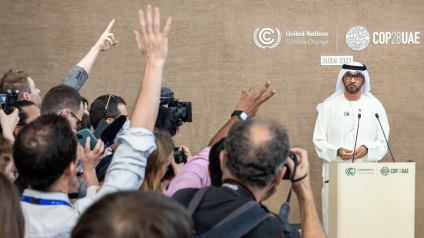The Nairobi Declaration includes measures to secure more resources for climate finance, ease the burden of debt and reform the functioning of multilateral banks. But he is silent about the elephant in the room: the need to ask for the gradual farewell to all fossils
The results of the 1st Africa Climate Summit finished yesterday in Kenya
(sustainabilityenvironment.com) – Debt cancellation, a global carbon tax, more African voices in multilateral development banks. And silence on the fossil phase-out. These are the pillars of the common position that the countries of Africa at COP28 in Dubai in December will adopt, just approved at the 1st Africa Climate Summit in Nairobi, Kenya.
A position built all around the deep review of the current climate finance. The main proposal contained in the Nairobi Declaration is the request to all countries to: “mobilise to support the proposal for a global carbon tax regime, including a carbon tax on fossil fuel trade, maritime transport and aviation, which could also be complemented by a global tax on financial transactions”.
read also The EU insists: At COP28 we need to talk about fossil phase out
The carbon tax
The global carbon tax – versions of which have long been part of the proposals to address the climate crisis put forward by scientists, analysts, part of politics – should be the tool with which to collect, concretely, most of the money needed to finance mitigation and adaptation measures in the countries most affected by climate change.
This is one of the main issues under discussion for the post-2020 climate finance relaunch dossier. Previous efforts – the famous $ 100 billion a year by the wealthiest countries – have shown many weaknesses, including the difficulty of mobilizing the necessary resources in a short time and not to expose them too much to the seasonal changes of politics.
Friendly banks
At the same time, Africa at COP28 will call for a thorough restructuring of the mechanisms for access to global funding. The Nairobi Declaration calls for “a new financial architecture that responds to Africa’s needs, including debt restructuring and the reduction”. Demand reflects the growing frustration at the high cost of funding on the continent. So more African representatives are on the various boards of multilateral institutions but also an intervention to get Africa out of the trap of debt trap.
Africa at Cop28 in Dubai will say nothing about fossils
No position, not even mentioned, regarding the gradual abandonment of fossils. A lack that “speaks“: Today Africa is split between countries that want to focus especially on renewables and those who are determined to exploit fossil resources, especially gas, to make cash in a short time. The latter looks at the so-called “fair share” of emissions – with Africa at the bottom of the world – while the former puts the emphasis on the global carbon budget. Two positions that have not (yet) found a synthesis. So Africa at the COP28 in Dubai, in all likelihood, will not give support to the EU and the other about 80 countries that for a year have been asking to officially put on the agenda the theme of farewell to all fossils, not only coal and subsidies.













